What Are Groom’s Parents Supposed to Pay For? A Handy Guide
Planning a wedding involves a lot of decisions, and figuring out who pays for what can be one of the confusing parts. You’re probably wondering what expenses the groom’s parents traditionally handle. The groom’s family typically covers the cost of the rehearsal dinner, the marriage license, and the officiant’s fee. They may also contribute to the honeymoon and some floral arrangements, like the bride’s bouquet and boutonnieres for the groomsmen.
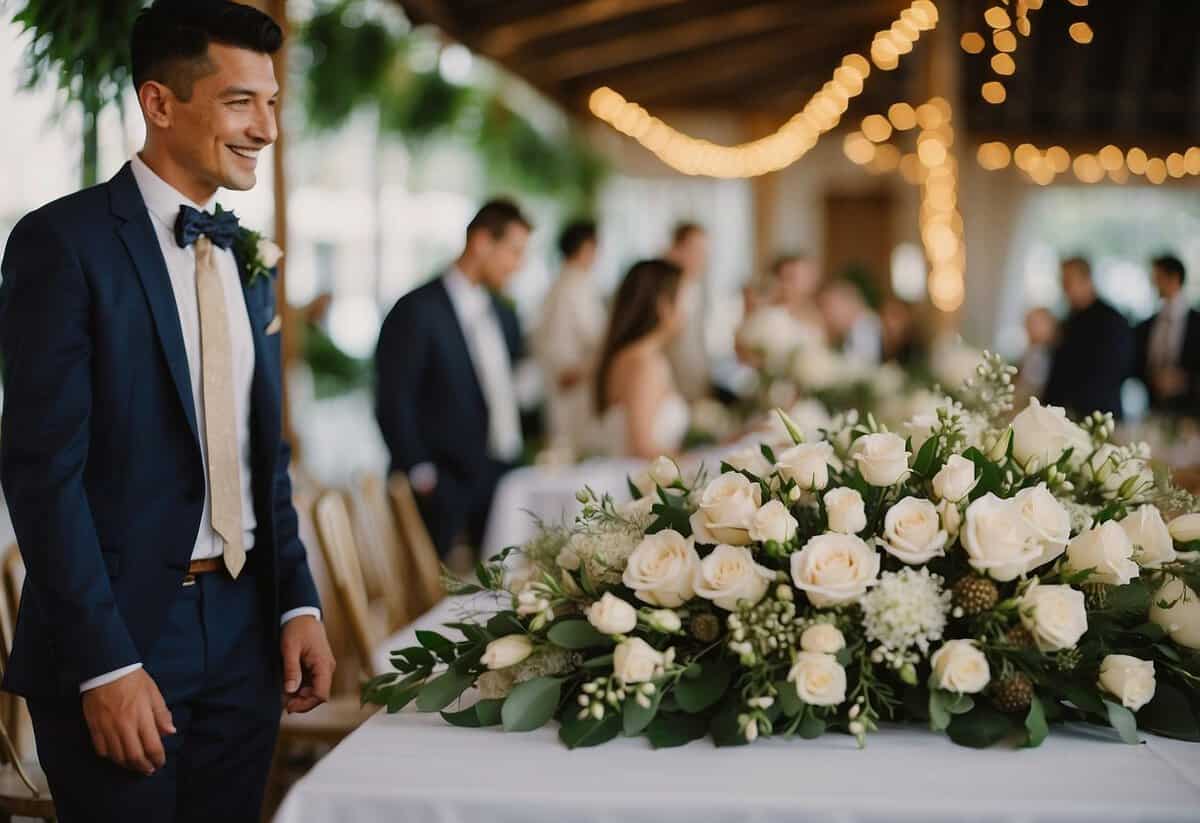
Another important expense for the groom’s family is the accommodation for their out-of-town guests. This gesture shows hospitality and ensures that friends and relatives are comfortable. They might also pay for special attire, such as the groom’s suit and accessories, and gifts for the best man and groomsmen.
While traditions can vary, and many couples share costs differently nowadays, having a clear understanding of these contributions can make planning smoother. With everyone aware of their roles, you can focus more on enjoying the celebration.
Roles and Responsibilities

Understanding what groom’s parents are supposed to pay for and their roles in the wedding planning can help minimize any potential stress. This section will outline financial responsibilities and how to handle contributions from both families.
Defining Financial Responsibilities
When planning a wedding, groom’s parents traditionally have specific financial responsibilities. One notable expense is the rehearsal dinner. They are also often responsible for covering the officiant’s fee, especially if it is a donation-based service.
Groom’s parents may also cover some floral expenses like the wedding bouquet, boutonnieres for the groomsmen, and corsages for honored guests. Sometimes, they may pay for alcohol at the reception or even the honeymoon. It’s helpful to have open conversations early to set clear expectations.
Navigating Family Contributions
Your role involves more than just financial assistance. Effective communication is key in navigating contributions. Sit down with the bride’s family and discuss who pays for which aspects of the wedding. This helps in aligning everyone’s expectations and avoids misunderstandings.
Being supportive is equally important. Offer to help with various tasks, like arranging transportation or organizing the guest list. You can also provide emotional support to your son during this special time. Ensure your contributions are framed as support rather than obligations.
Finally, keep the lines of communication open with both families. This ensures that everyone feels included and respected throughout the planning process. Respecting traditions while accommodating personal preferences will create a seamless and joyful wedding experience for all involved.
Pre-Wedding Events
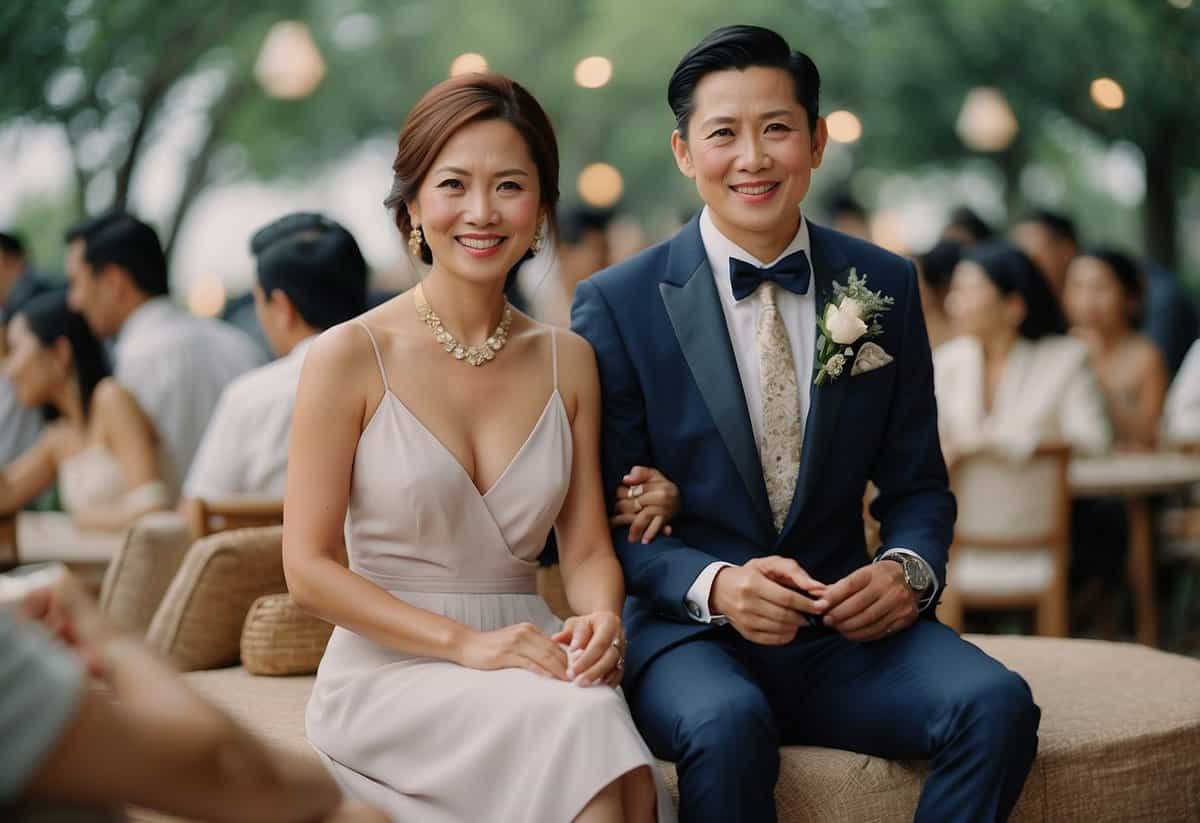
Before the big wedding day, there are several key events where the groom’s parents play important roles. These events include the engagement party, the rehearsal dinner, and the welcome party, each with its own unique responsibilities and traditions.
Engagement Party Planning
The engagement party is often the first celebration, where the couple’s engagement is announced. The groom’s parents can either co-host with the bride’s parents or throw their own party. Planning this event involves selecting a venue, sending out invitations, and arranging food and drinks.
When preparing for this event, consider the guest list carefully. Inviting close family and friends keeps the gathering intimate and special. The party should also reflect the couple’s personality, whether it’s a formal dinner or a casual backyard barbecue.
Don’t forget about decorations and entertainment. Simple touches like flowers and music can transform the atmosphere and create a memorable experience for everyone.
Rehearsal Dinner Details
Traditionally, the groom’s parents host the rehearsal dinner. This event happens the night before the wedding and is a time when the wedding party and close family come together. It’s a more relaxed gathering compared to the wedding day.
Key responsibilities include booking a venue, choosing a menu, and sending out invites. You might also want to include short speeches or toasts to honor the couple. This dinner allows both families to get to know each other better and ease any pre-wedding nerves.
Make sure to consider any dietary restrictions and preferences of your guests when planning the meal. It’s also a good idea to have a timeline for the evening to ensure everything runs smoothly.
Welcome Party Considerations
For guests traveling from out of town, a welcome party can be a warm way to kick off the wedding festivities. The groom’s parents often take the lead on organizing this event, which usually happens a day or two before the wedding.
Think about the venue and type of welcome party you want. It can range from a casual gathering in a hotel lounge to a more organized event in a restaurant or private space. Provide light snacks and drinks, allowing guests to mingle and relax.
Planning activities or icebreakers can help guests get to know one another. It sets a welcoming tone for the weekend, ensuring everyone feels included and excited for the upcoming wedding festivities.
For more details on pre-wedding events and responsibilities, you can read What Does the Groom’s Family Pay For?.
Ceremony and Reception Costs
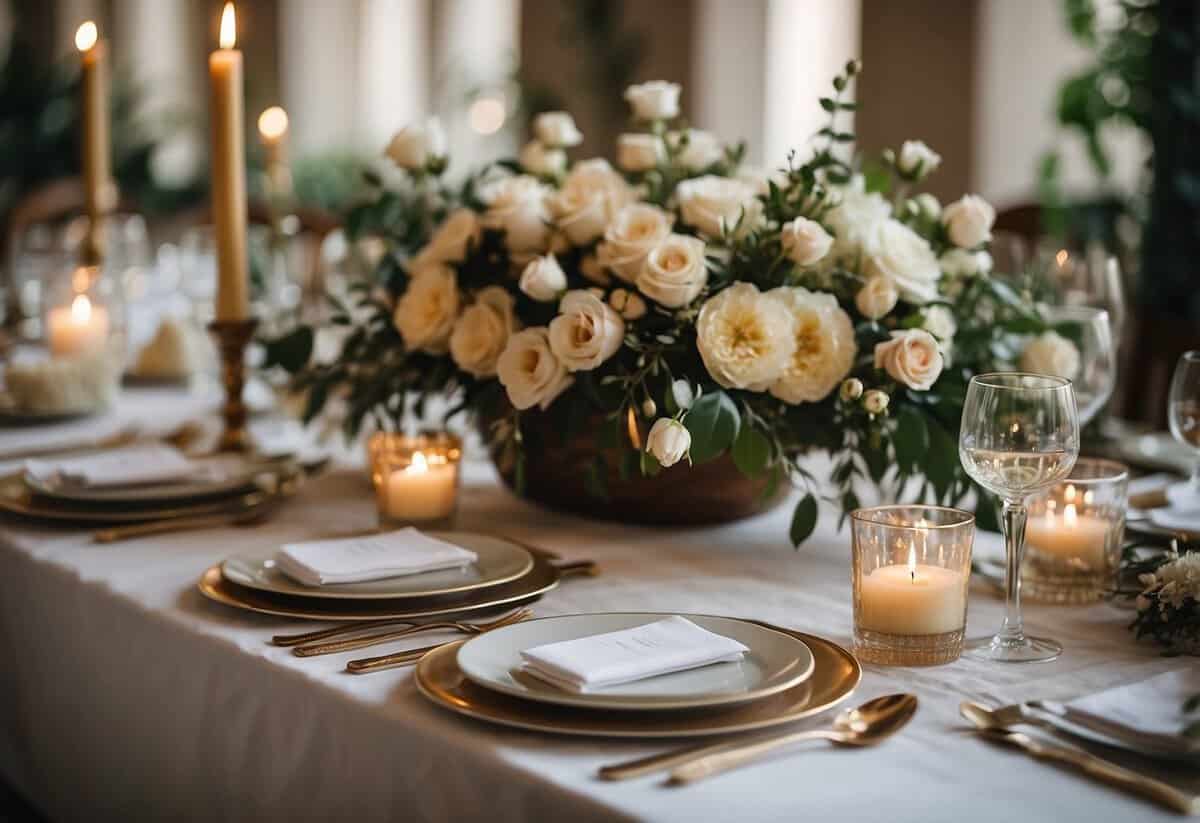
For the ceremony and reception, the groom’s parents typically handle several key expenses. These can vary significantly depending on traditions and agreements between families. Below, we detail the main costs they might cover.
Attire and Accessories
The groom’s parents usually pay for the groom’s attire. This includes his suit or tuxedo, tie, cufflinks, and shoes. It’s important for the groom to look his best, so this can be a significant investment. They may also help with any special accessories like a pocket watch or personalized cufflinks.
In addition to the groom’s attire, they sometimes cover their own wedding outfits. This ensures they are properly dressed for the occasion and aligned with the wedding’s theme or color scheme.
Venue and Officiant
The groom’s parents might be responsible for certain venue-related costs. While the bride’s family often handles the primary wedding venue expenses, the groom’s family may cover the reception venue or contribute to its cost.
They might also pay for the officiant’s fee or offer a cash gift, especially if the officiant is a minister. This is a way to support the person conducting the ceremony and ensure the ceremony goes smoothly.
The Marriage License
Part of the wedding costs includes securing the marriage license. This is essential for making the union legally binding. In many cases, the groom’s parents will take care of this expense.
Obtaining a marriage license requires a bit of paperwork and a fee, which varies by location. This ensures all the legal aspects of the wedding are handled properly.
Flowers and Decorations
The groom’s family often contributes to the floral arrangements and decorations. They might cover the cost of the groom’s boutonniere, the boutonnières for the groomsmen, and the corsages for honored guests.
Additionally, they may fund other personal flowers such as the bride’s bouquet. Decorations for the reception venue, like centerpieces and thematic decor, can also fall under their responsibility. These elements help create a beautiful and memorable setting for the wedding celebrations.
Reception Details
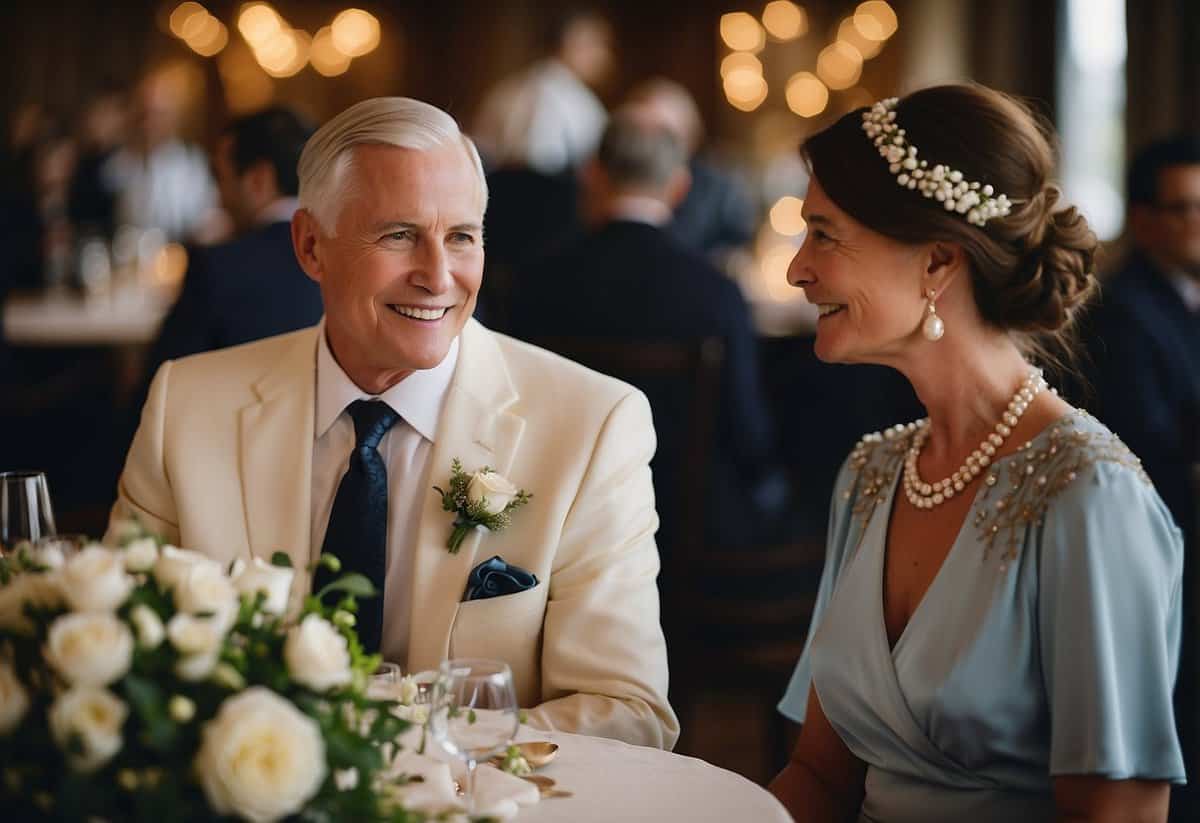
At the wedding reception, the groom’s parents often cover specific costs. These can include several expenses tied to food, drinks, entertainment, photography, and videography to ensure the event is memorable.
Food, Beverage, and Entertainment
One of the key responsibilities is paying for the reception’s food and beverages. This means covering the catering costs, which include meals for the guests. If applicable, they also pay for the reception alcohol, like wines, beers, and cocktails.
The groom’s parents might also take care of the wedding cake. This centerpiece often features custom designs and flavors that delight guests. For entertainment, hiring a DJ or band to keep the party lively is something the groom’s family often handles. Sometimes, they might even organize additional reception entertainment, like a photo booth or games.
Photography and Videography
Capturing memories is essential at any wedding. Therefore, the groom’s parents may also cover photography and videography costs. Hiring a professional photographer ensures that all moments, from the ceremony to the reception, are well-documented.
Videographers capture not just still photos but live moments and speeches, allowing you to relive your special day. These services, while sometimes pricey, provide lasting memories and are a crucial part of wedding expenses.
Final Touches and Post-Wedding
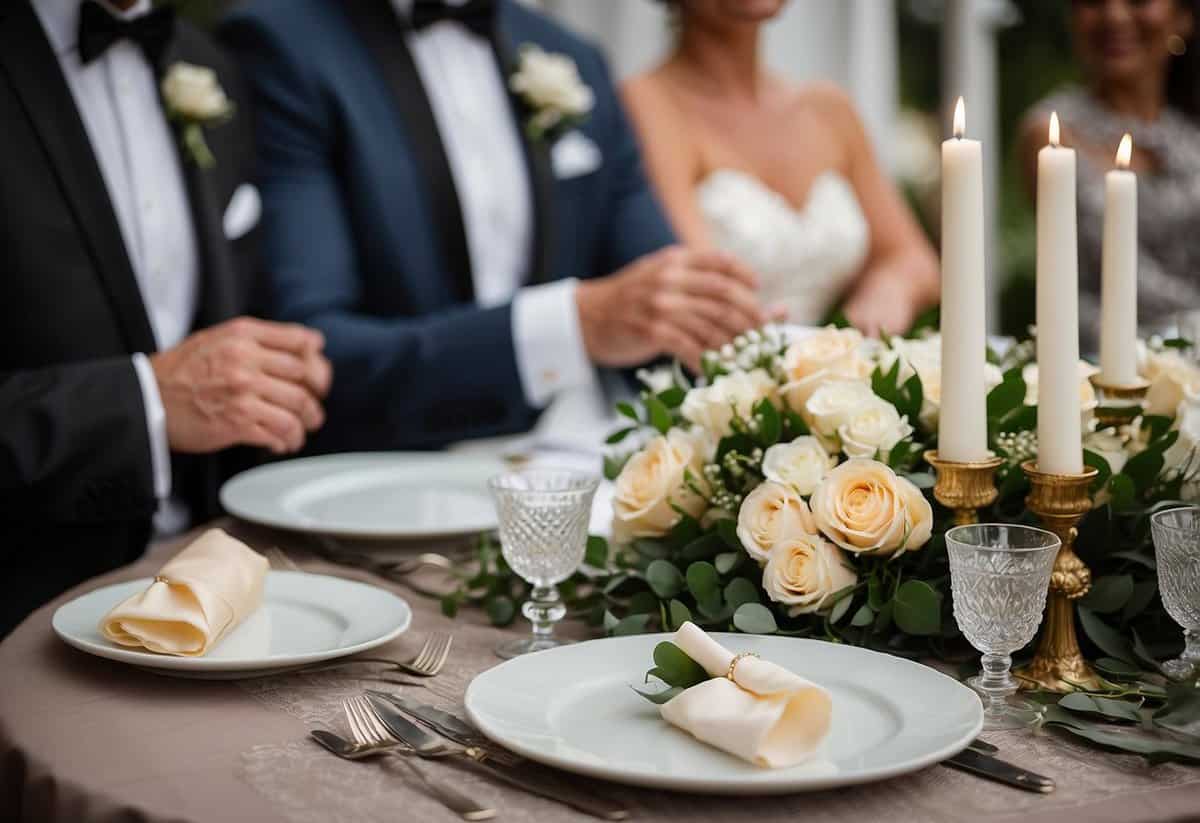
As the wedding winds down and the big day turns into lasting memories, there are still important tasks and considerations for the groom’s parents. These include taking care of the honeymoon arrangements and showing gratitude to those who helped make the day special.
Honeymoon and Lodging
The groom’s parents often play a key role in arranging the honeymoon. You might help cover honeymoon costs, including travel, lodging, and activities. Setting up a honeymoon fund as a gift can be a helpful way to manage expenses.
In some cases, you may also assist with wedding night accommodations. This could involve booking a romantic room for the couple’s first night or arranging lodging for out-of-town guests.
Providing support in these areas ensures a smooth transition into married life.
Gratitude and Reciprocation
After the wedding, expressing gratitude is vital. Make sure to thank the guests and vendors who contributed to the celebration. You can send out personalized thank-you cards, or even host a small gathering to say a few words of appreciation.
It’s a good idea to offer wedding gifts or favors to those who helped. Small tokens of appreciation, like personalized favors or thoughtful gifts, can go a long way in showing your thanks.
Reciprocating the kindness and effort of others underscores the importance of community and support in celebrating such a happy occasion.




